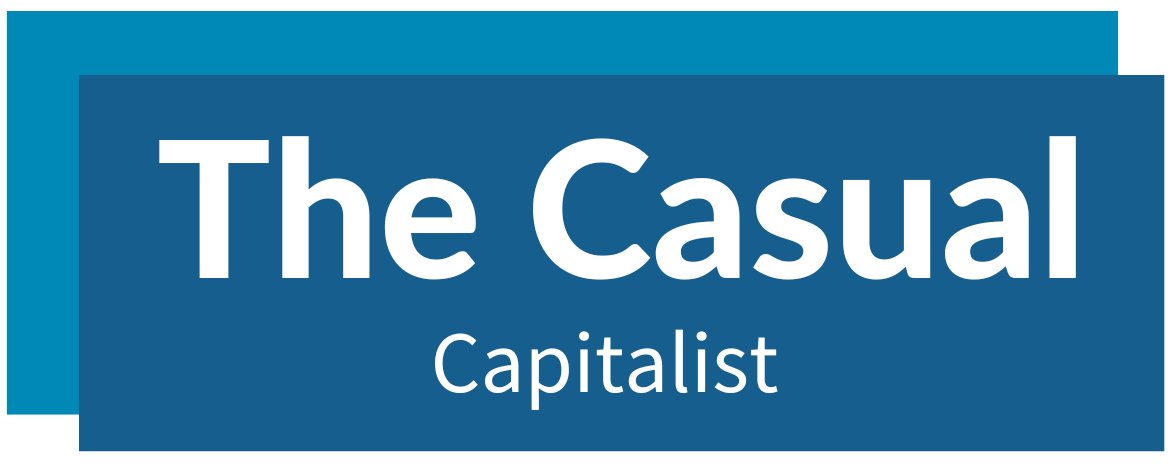The Digital Senior

Digial Seniors and Retirement
So you have worked hard, saved for retirement and done all the right things like investing in low cost index funds and started using the 4% Rule to withdraw from your retirement account. But what most people don’t like to talk about is that retirement can be boring. Especially if you have worked your entire life, enjoy being around other people and like feeling a sense of accomplishment.
Introduction To The Digital Senior Series
In this series we will teach readers how to embrace the sharing economy to live more independently and earn supplemental income during retirement years.
We have heard time and time again from Casual Capitalists that the sharing economy is so much more than an income tool.
“Glenn, my Mom is in her 80’s and I’ve set her up with AskForTask where she gets Taskers to do her household chores. It has helped her stay independent and continue living at home” said Jeff from Toronto.
Or Jessie from Seattle, who’s elderly parents are now getting weekly cleaners coming from TaskRabbit, drivers from Uber for shopping and medical appointments, and a dog walker from DogVacay.
The proverbial light bulb has been lighten.
Meet Jim
Jim, a soon-to-be retired electrician, isn’t quite sure what he wants to do in retirement.
“I don’t want to sit at home all day, but I also don’t want something that ties me down” Jim told me at his favorite cafe in Montreal’s Old Port.
“Something flexible, but worth my time” he added.
“What if you could have it all? Income supplementation, social interactions, and keeping busy” I interjected.
Jim, meet the sharing economy. As I delved deeper into the possibilities for Jim, it was like watching a slow motion light bulb moment.
“So you’re saying I can download an app on my phone, and accept only the jobs I want, when I want?”
“Yes, that is exactly what I’m saying Jim” I laughed.
Although I got a free coffee out of it, I realized that late night coffee wasn’t the best way to get this message out to retirees and seniors. Enter the Digital Senior, a series of posts dedicated to teaching retirees how to use new technological tools to make their lives easier.
With the Baby Boomer generation retiring en mass in the coming years, we as a society will need to pick up the slack. And slack there is. According to the World Health Organization, the number of people aged 65+ will, for the first time in history, outnumber those under the age of 5.
As of today, one in three Americans is 50+. According to estimates, by 2030 one in five Americans will be 65+.
The year 2011 was an interesting milestone. Here, the first of about 80 million Baby Boomers began their retirement. As each year passes, an approximate 4 million Boomers reach the age of 55.
Estimates are that by 2030, there will exist 72 million seniors in the U.S., a number that is double what it was for 2000.
In Canada, this demographic shift is just as striking. Over the coming 25 years, Canadians who are 65+ will double. This will make seniors roughly 25% of the entire population by 2036.
Although this is the largest demographic change since WWII, this shift has implications for so much more. In Canada, estimates are that Canada’s health care system is facing a funding gap of $537 billion based on aging demographics.
This is where the sharing economy and the Casual Capitalist can help. This series of posts will outline strategies for independent, and therefore more economical, living. This applies to Baby Boomers and those currently struggling with independent living. We can do this now by leveraging digital tools that have been developed during the ongoing boom in the sharing economy.
These tools can facilitate independent living, and earning, in ways we could of never imagined a decade ago. Outside of serious mobility and medical concerns, there is no reason to pay $4,000 a month to live in an assisted living facility anymore.
In the Digital Senior Series, this first article will introduce readers to the concept of the sharing economy and its benefits. In the second post, we will cover specific sharing economy platforms that can facilitate independent living. And thirdly, we will introduce several sharing economy platforms that can help seniors work flexibly and earn supplemental income.
What Is The Sharing Economy? A Shift In Consumption Behaviors…
“Glenn, sweetheart, I love what you’re doing but I have no idea what the sharing economy is” – Glenn’s Mom, last week.
Dear Mom and all Baby Boomers,
Sharing Economy (noun): economic activity that involves individuals buying or selling usually temporary access to goods or services especially as arranged through an online company or organization.
The sharing economy is the fundamental shift from the scarcity principle to one of abundance. The Boomer demographic is a consumer and ownership generation. What we are witnessing now is a shift from a consumer mentality to one of access. Millennials are embracing access, and so should Boomers (more on this later).
Why would I own a car when it sits idle for 95% of the time? Why would I not rent out a spare room in my home to make some money? Why wouldn’t I open up my home to tourists looking for a local dining experience? I want to stay social, so why wouldn’t I offer tours of local attractions to tourists? If I can’t drive myself, why wouldn’t I use Uber as a cheaper and more convenient alternative to taxi’s?
These are some of the rhetorical questions of the new generation of access consumers. And we have the sharing economy to thank for this.
Thank You Sharing Economy
So what is the sharing economy exactly?
The sharing economy is about how we capitalize on abundance. Specifically, the sharing economy is composed of hundreds of online platforms that enable people to turn otherwise unproductive assets into income producers. This includes homes, cars, hobbies, pets, spare space, parking spots, clothes, consumer items, and much more.
When you aren’t using something, others will pay you to use it. You may have heard of Airbnb (home-sharing) and Uber (ride-sharing), but there are hundreds of other sharing economy platforms out there.
The process is simple. You register on the particular website as a renter or owner. Other users will pay for access to your assets (cars, homes, skills, etc.) or allow you to pay for access to theirs. Simple as that.
This new business model is not sharing, it’s access. People are craving access and business is booming!
PriceWaterhouseCoopers (PWC) notes that the sharing economy currently earns $15 billion a year. By 2025, PWC predicts this will grow to $330 billion.
Airbnb has 2 million listings worldwide. Starwood-Marriot, the largest hotel chain in the world, has 1.1 million rooms. Almost double!
According to TIME Magazine, 1 in 5 American adults have earned income with the sharing economy. Similarly, they found that 2 in 5 adults have used sharing economy services.
The sharing economy is here to stay, and there are fantastic ways that Baby Boomers can leverage sharing economy services to live more independently, or earn some supplemental income. But more on this later.
In sum: out with scarcity, in with abundance. Out with consumerism and ownership, in with access.
Good to go? Let’s move on to more important discussions of how the sharing economy is helping seniors.
Sharing Economy Success Stories From Seniors
Meet William
In 2014, 63-year-old William retired from a long career in sales. William quickly found out that he required some form of income supplementation as he still had a mortgage.
William stumbled on TaskRabbit last year. This is one of many tasking platforms in the sharing economy where you can earn income by completing the to-do lists of others. This includes cleaning, handyman work, painting, assembling furniture, and much more.
In order to start working on TaskRabbit, William had to pass a background check and complete a couple training courses.
Once he started working on TaskRabbit, William found that his specialty was assembling Ikea furniture. William estimates that he works about six hours a week, and earns about $2,000 a month. That’s great income!
Meet Robert
Robert is 79 and lives in Florida. After retiring in 2013, Robert found like many other retirees that he needed to find something to occupy his time.
Enter Turo (formerly RelayRides). Robert found the popular car-sharing platform Turo from researching his options online. Turo allows you to rent out your vehicle when you aren’t using it.
You can think of it as a traditional car rental service. Except, you’re not renting from a large company, you’re renting from individuals who have agreed to share their vehicle for a cost. Robert decided to try it out, after all, it couldn’t hertz (sorry, couldn’t resist!).
On average in the U.S., cars idle 22 hours out of the day. That’s 20 billion car hours wasted every year!
So Robert decided to rent out his Mustang on Turo.
In 2014, Robert earned $6,000 for what can be considered less than part-time work. Robert would greet the renters, go over terms, and sometimes would deliver the car to them. That’s it!
Robert notes that this car-sharing service is so popular that many of his friends are purchasing second vehicles to rent.
Meet Janice
Janice is a 70-year-old Uber driver from Minneapolis. She began driving in 2013 after a long career as a local teacher.
Janice works about 20 hours a week, averaging 2-3 hours a day. Janice pulls in about $1,500 a month, which translates into an extra $1,000 after her costs.
“Not only do I get to make supplemental income, but I meet fascinating people. It’s a great way to stay social” she notes.
Many retirees, like Janice, are choosing to work in the sharing economy to supplement income and remain social. Specifically for Uber, a quarter of all drivers are over the age of 50.
A Growing Opportunity For Independent Living
According to research by Emergent and Intuit, 18 percent of sharing economy workers are 55 or older. This research concluded that “the number of older Americans seeking [this type of] work will likely continue to grow.”
The aging population isn’t being forced to work either, they are choosing to. A recent poll found that 72 percent of pre-retirees indicated they wanted to work during their retirement.
According to a report from PWC, those aged 55+ are one of the most frequent users of sharing economy platforms. Seniors, in fact, participated in the sharing economy at a rate of 4x that of the general U.S. population.
And seniors are becoming much more technologically savvy as well. According to Pew Research, 74 percent of those aged 65+ own a mobile device.
Taking all of this into consideration, we at the Casual Capitalist see the massive opportunity the sharing economy holds for seniors and retirees.
The remainder of this series will be broken into two parts. Next, we will discuss the best ways to live independently by being a user of the sharing economy. Following this, we will provide several action plans on the best ways for seniors to earn money in the sharing economy.
Thanks for joining us, and stay tuned!
The Casual Capitalist
